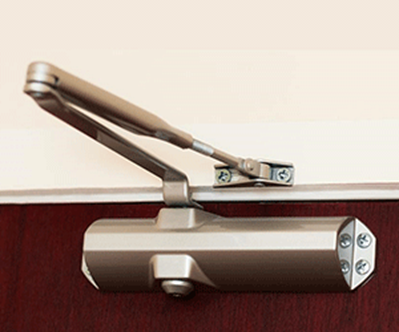How To Choose The Right Door Closer

Choosing a door closer changes depending on many different factors including customer preference, manufacturer options, and building specifications. Other factors to consider include:
- Size and weight of the door
- Location of the door
- Opening and closing frequency
- Mounting location
- Affordability
- Backswing requirements
Traffic Volume Considerations
In general, overhead door closers are used typically for medium- to heavy-traffic locations, and they are extremely durable. There are options for interior or exterior doors, and they’re one of the most common types that are used.
Floor-spring or overhead spring closers, on the other hand, are a bit more durable, and they work nicely for heavy traffic doors. Additionally, they are not visible like overhead closers, making them one of the most attractive options. Finally, concealed and frame-mounted closers are typically used for medium traffic, interior doors.
Deciding on a door closer depends on a variety of factors. It starts with understanding the various types, and the benefits that they have to offer. Then, matching the door to the type of door closer that you’re using is the key. Heavier doors and doors with higher traffic require durable, strong door closers. Lighter doors do not. Either way, if you’re unsure, the best option might be to consult with a door installer or vendor.
Building Code Considerations
Each area can have slightly different building codes depending on the location of the building. Federal, state, and even local building codes can have an impact on determining the door closer required. The Builders Hardware Manufacturers Association (BHMA) and American National Standards Institute (ANSI) provide extensive standards for door closers. The full list can be found here. Generally, each door closer needs to meet different levels of performance broken up in 3 grades with 1 being the highest and 3 being the basic level. Performance is judged based on cycle testing as well as closing force and finish tests. The tests are done in a neutral air pressure laboratory at 60-85 degrees F.
Door closers have the following requirements:
- Grade 1: 2,000,000 cycles at 60% efficiency
- Grade 2: 1,000,000 cycles at 60% efficiency
- Grade 3: 500,000 cycles at 50% efficiency
If doors are being installed into a high volume area like a major office building or shopping mall, it is crucial to only use door closers that have been rated as Grade 1 closers.
The American Disability Act also provides a list of clear requirements when looking at doors and door closers. The ADA states that interior doors should require no more than 5 lbs of force to operate and exterior doors should have the minimum force possible. The ADA also states that the closing or swing speed shall not be faster than 5 seconds and the latching speed should be quick enough to latch the door, but not slam it.
Making the Right Choice
As a building manager or owner, all this can be overwhelming. It’s essential to first consider building codes and traffic requirements before looking at the different aesthetic options. The wrong type can lead to the closer needing replacement in a short-period of time and also could lead to fines. As mentioned earlier, it’s essential to choose ANSI Grade 1 closers for high volume doors. If you have a small interior office, Grade 2 door closers are acceptable and for closets, Grade 3 closers will work fine.
Door Closer Sizes: Most closers are adjustable, but the most common are a size 4 for an external 36” inch wide commercial door, and a size 3 for an internal commercial or residential application. There are some applications that may require a special type of closer, such as a hold open feature, positive or spring stop.
Aesthetic Considerations
A door closer might be chosen for its appearance, as some are more attractive than others. The majority of door closer units are adjustable, allowing operators to set a specific closing rate and opening resistance. Types of door closers include:
